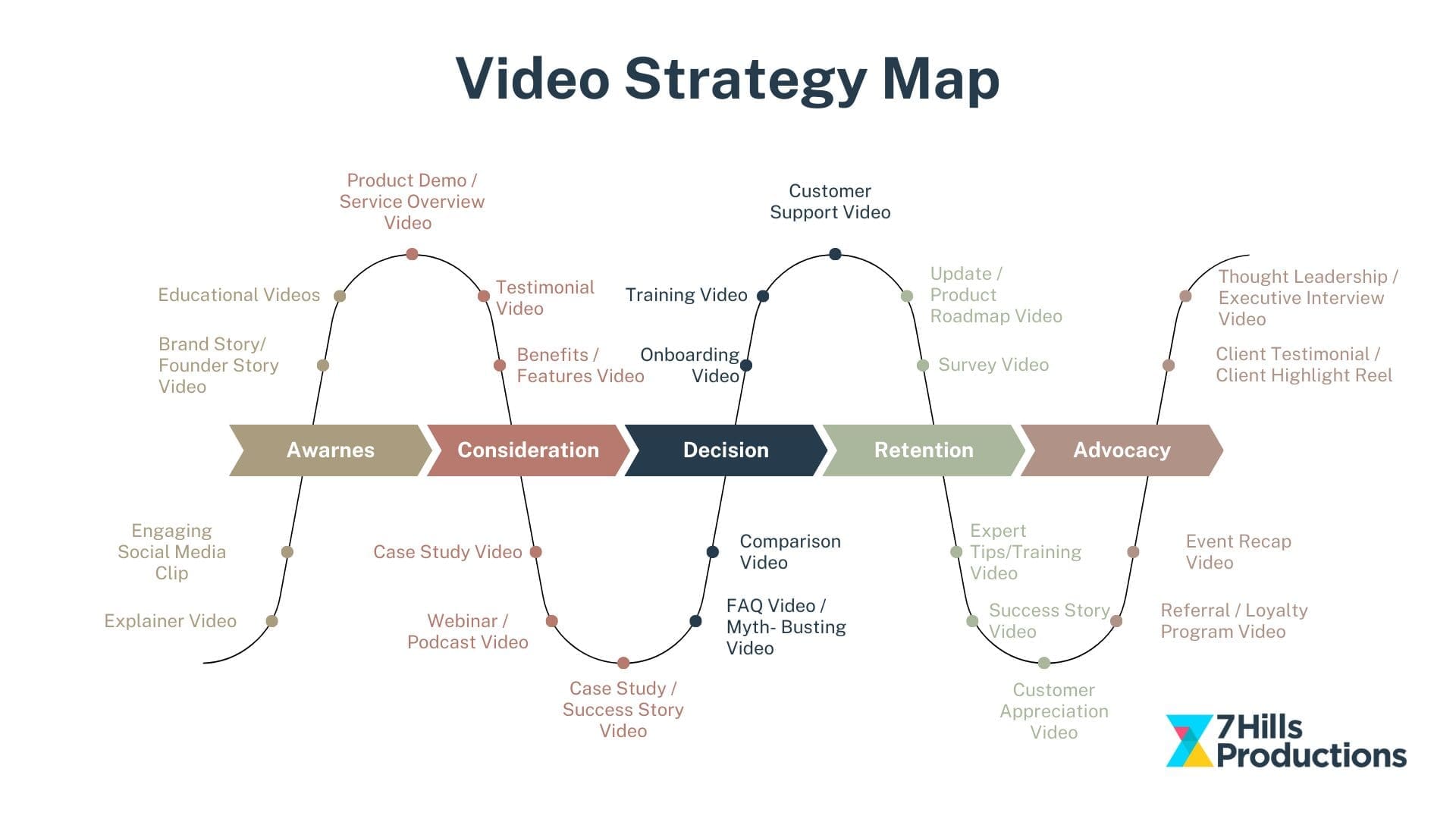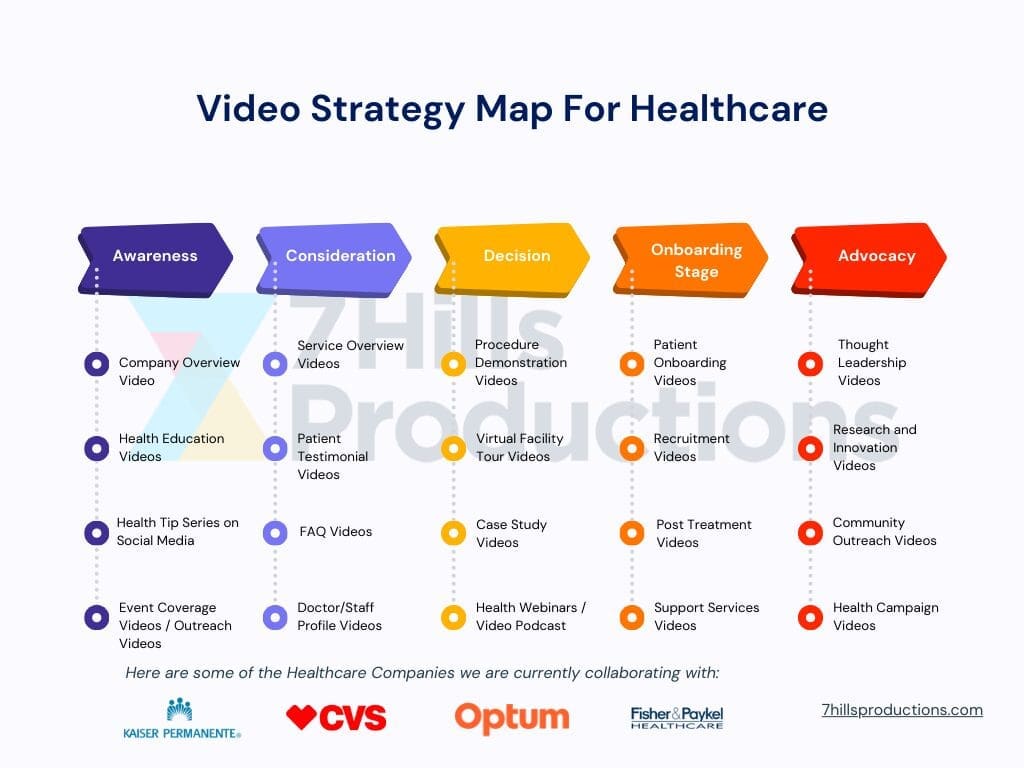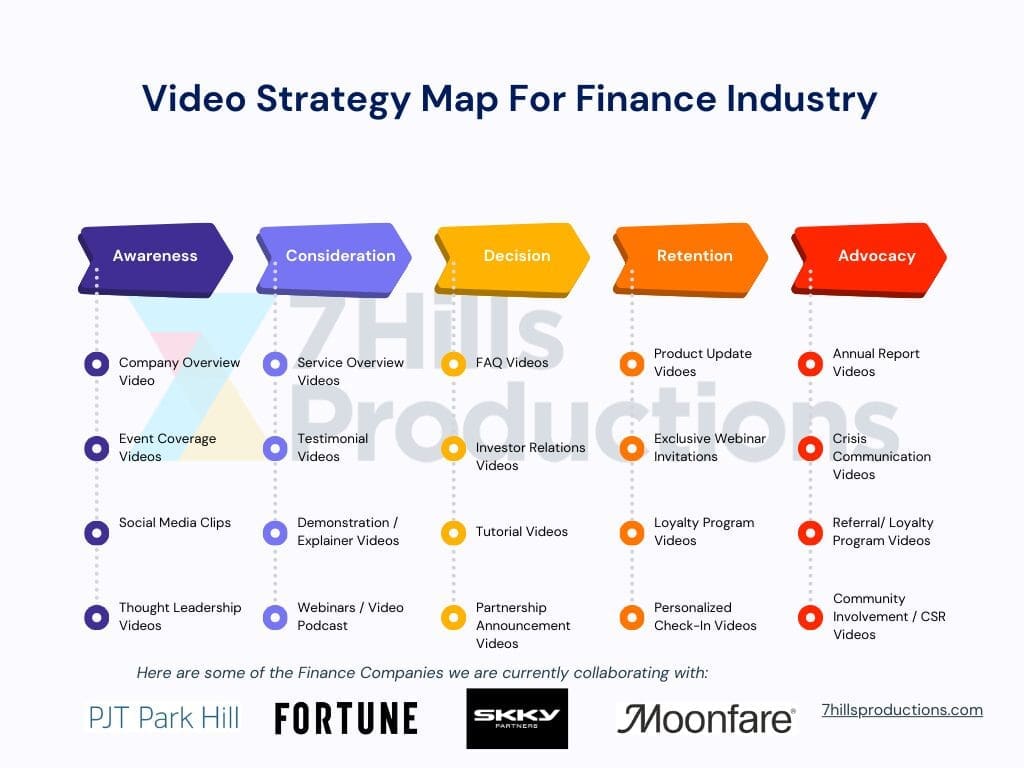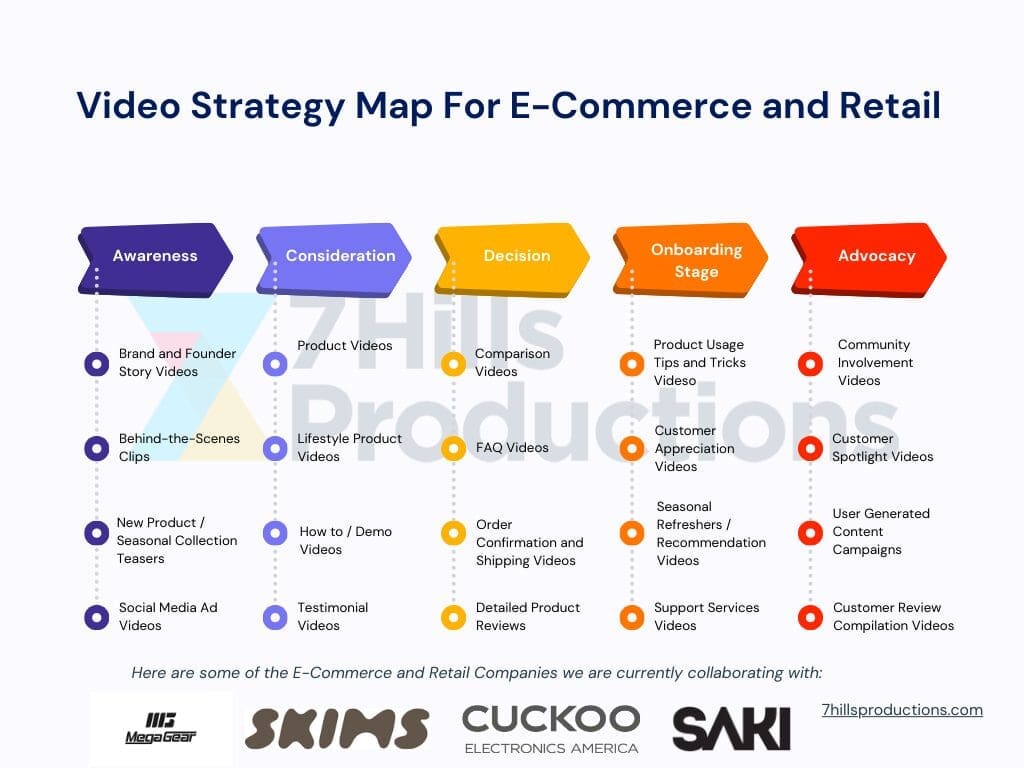Attention Deficit Conquered: Ultimate Guide to Video Content for the Buyer Journey
Gone are the days of generic marketing tactics. Today’s savvy consumers crave targeted content that resonates with their specific needs. Enter the hero: buyer journey video content – a strategic approach to crafting video content for each stage of the marketing funnel (awareness, consideration, decision, retention, advocacy ). This comprehensive guide, brought to you by 7 Hills Productions, equips you with the knowledge to create video content for businesses that not only engages viewers but also converts them at every crucial stage of the buyer’s journey. We’ll bridge the gap between video marketing strategy and execution, guiding you through the different video formats and lengths ideal for each buyer journey stage for video. Get ready to discover the optimal mediums for delivering your message and gain valuable insights on the frequency and total content required to conquer the customer journey with captivating video content.

Part 1: Understanding the Buyer’s Journey
The buyer’s journey consists of five main stages: Awareness, Consideration, Decision, Retention, and Advocacy. Each stage requires different types of video content to effectively move prospects closer to making a purchase and maintaining a long-term relationship.
- Awareness Stage: Potential customers realize they have a problem or need.
- Consideration Stage: Customers define their problem and research options to solve it.
- Decision Stage: Customers choose a solution and make a purchase.
- Retention Stage: Keeping customers engaged and satisfied post-purchase.
- Advocacy Stage: Customers become brand advocates, recommending your product or service to others.
Video Content for Each Stage of Buyers Journey
Awareness Stage Video Content
Touch Points:
- Explainer Videos: Short videos (1-2 minutes) that introduce the problem and how your product or service can solve it. This is crucial for awareness stage video content.
- Social Media Clips: Quick, engaging videos (30-60 seconds) for platforms like Instagram, Facebook, and LinkedIn.
- Branded Story Videos: High-quality videos (2-3 minutes) that tell your brand story and founder story videos and build an emotional connection.
- Educational Videos: In-depth videos (3-5 minutes) that provide valuable information related to the customer’s problem.
Appropriate Mediums:
- Social media platforms (Instagram, Facebook, LinkedIn, X, TikTok)
- YouTube
- Company website and blog
We have created a comprehensive blog that discusses the best platforms for maximizing the reach of your videos.
Content Creation Frequency:
- Social Media Clips: Weekly
- Explainer Videos: Monthly
- Branded Content Videos: Quarterly
- Educational Videos: Monthly
Consideration Stage Video Content
Touch Points:
- Product Videos: Short videos (2-3 minutes) demonstrating your product or service in action. This is essential for consideration stage video content.
- Testimonial Videos: Customer testimonials (1-2 minutes) that build trust and credibility.
- Case Studies: In-depth videos (3-5 minutes) showcasing success stories and real-life applications.
- Webinars/Podcast/ Youtube: Longer live or recorded sessions (30-60 minutes) providing valuable insights and interactive Q&A.
Appropriate Mediums:
- Company website and blog
- Email marketing campaigns
- YouTube
- Webinars and virtual events
Content Creation Frequency:
- Product Videos: Bi-monthly
- Testimonial Videos: Monthly
- Case Studies: Quarterly
- Webinars: Monthly
Decision Stage Video Content
Touch Points:
- FAQ Videos / Myth Busting Videos: Short videos (2-3 minutes) answering common questions and addressing concerns. This is a key aspect of decision-stage video content.
- Comparison Videos: Videos (3-5 minutes) comparing your product or service with competitors.
- Onboarding Videos: Step-by-step guides (5-10 minutes) to help new customers get started with your product or service.
- Live Demos: Live streaming sessions (10-20 minutes) where potential customers can see the product in real-time and ask questions.
- Training Videos: Detailed tutorials (5-15 minutes) on using your product or service effectively.
Appropriate Mediums:
- Company website and blog
- Email marketing campaigns
- YouTube
- Live streaming platforms (Facebook Live, Instagram Live, YouTube Live)
Content Creation Frequency:
- FAQ Videos: Monthly
- Comparison Videos: Quarterly
- Personalized Videos: As needed
- Live Demos: Monthly
Retention Stage Video Content
Touch Points:
- Survey Videos: Step-by-step guides (5-10 minutes) to help new customers get started with your product or service.
- Expert Tips and Training Videos: Detailed expert tutorials (5-15 minutes) on effectively using your product or service.
- Update Videos / Product Roadmap Video: Informing customers about new features, updates, or improvements (2-3 minutes).
- Customer Support Videos: Quick solutions to common issues (2-3 minutes).
Appropriate Mediums:
- Company website and customer portal
- Email marketing campaigns
- YouTube
Content Creation Frequency:
- Onboarding Videos: As needed
- Training Videos: Monthly
- Update Videos: Bi-monthly
- Customer Support Videos: Monthly
Advocacy Stage Video Content
Touch Points:
- Customer Success Stories: Videos (3-5 minutes) highlighting how customers have succeeded in using your product or service.
- Referral Program Videos: Explaining the benefits of referring others (2-3 minutes). 19.
- Event Videos: Recap of events where customers and advocates are featured (3-5 minutes).
- Though-Leadership Videos / Executive Interview Videos: Thought leadership and executive interview videos build trust and credibility by positioning your brand as a source of valuable industry knowledge.
Appropriate Mediums:
- Company website and blog
- Social media platforms
- Email marketing campaigns
Content Creation Frequency:
- Customer Success Stories: Quarterly
- Referral Program Videos: Bi-annually
- Event Coverage Videos: As needed
- User-Generated Content: Ongoing
Part 2: Industry-Specific Video Content
Industry-specific video content is crucial because it addresses each sector’s unique challenges and needs, allowing businesses to connect more effectively with their target audience. Tailoring video marketing strategies to specific industries ensures that the content is relevant, engaging, and resonates with viewers, increasing the likelihood of converting leads into customers. By focusing on industry-specific nuances, companies can showcase their expertise, build trust, and demonstrate a deeper understanding of their audience’s requirements, ultimately driving better results and enhancing customer loyalty.
Healthcare Video Marketing Strategy and Video Content
Video production in the healthcare industry is critical for educating patients, building trust, and showcasing the expertise of medical professionals. High-quality healthcare video marketing strategy videos can simplify complex medical information, making it accessible and understandable for patients. To maximize the impact of video marketing, healthcare providers should focus on creating educational content, patient testimonials, and virtual tours of their facilities. Trends in healthcare video marketing include telemedicine promotional videos, animated explainer videos for procedures, and live Q&A sessions with doctors. Utilizing social media platforms and patient portals effectively can enhance engagement and reach.
Tips and Tricks:
- Use clear and simple language in educational videos.
- Highlight patient success stories to build credibility.
- Regularly update content to include the latest medical advancements.

Finance and Banking Industry Video Marketing Strategy and Video Content
Video production in the finance and banking industry is crucial for building trust, explaining financial products, and educating customers. Videos can demystify complex financial concepts, provide insights into services, and share customer success stories. Effective video marketing strategies include creating explainer videos, client testimonials, and webinars on financial planning. Trends in this sector involve using animated videos for financial literacy, live Q&A sessions with experts, and personalized video messages. Platforms like LinkedIn, YouTube, and company websites are ideal for reaching a broad audience.
Tips and Tricks:
- Simplify complex financial terms with clear, concise explanations.
- Use testimonials to build trust and credibility.
- Regularly update content to reflect the latest financial trends and services.

Retail and E-commerce Video Marketing Strategy and Video Content
In the retail and e-commerce industry, video production is pivotal in showcasing products, enhancing customer engagement, and driving sales. Videos can provide 360-degree views of products, unboxing experiences, and customer reviews. Effective video marketing strategies include creating product demo videos, user-generated content (UGC), and social media campaigns. Current trends involve live shopping events, shoppable videos, and influencer collaborations. Utilizing platforms like Instagram, Facebook, and TikTok can significantly boost brand visibility and engagement.
Tips and Tricks:
- Highlight key product features in short, engaging videos.
- Use user-generated content to build community trust.
- Incorporate clear calls to action (CTAs) to drive conversions.

Education Video Marketing Strategy and Video Content
In the education sector, video production is vital for attracting new students, enhancing learning experiences, and showcasing campus life. Videos can provide a virtual experience of the school environment and offer insights into academic programs. Effective video marketing strategies for educational institutions include creating campus tour videos, student testimonials, and live-streamed lectures or events. Current trends involve interactive and augmented reality (AR) experiences, virtual open days, and alumni success stories. Leveraging platforms like YouTube, LinkedIn, and educational websites can significantly boost visibility and engagement.
Tips and Tricks:
- Focus on storytelling to make campus life relatable.
- Use video analytics to understand which content resonates most with prospective students.
- Incorporate subtitles to make videos accessible to a broader audience.
Technology Industry Video Marketing Strategy and Video Content
For technology companies, video production is essential for demonstrating product features, explaining complex concepts, and engaging a tech-savvy audience. Videos can effectively showcase product demos, customer testimonials, and thought leadership content. Key trends in tech video marketing include live streaming product launches, creating short explainer videos, and producing in-depth webinars. To stay ahead, tech companies should use high-quality animations, engage with viewers through interactive content, and regularly post updates on platforms like YouTube, LinkedIn, and specialized tech forums.
Tips and Tricks:
- Use detailed product demos to highlight unique features.
- Incorporate customer testimonials to build trust and credibility.
- Keep videos concise and focused to maintain viewer interest.
Real Estate Video Marketing Strategy and Video Content
In real estate, video production is essential for showcasing properties, engaging potential buyers, and building agent credibility. Videos can provide virtual tours, highlight neighborhood features, and share client testimonials. Effective video marketing strategies include creating property walkthrough videos, market update reports, and agent profile videos. Trends in real estate video marketing include using drone footage for aerial views, 360-degree virtual tours, and live open houses. Leveraging platforms like YouTube, Facebook, and real estate websites can enhance visibility and engagement.
Tips and Tricks:
- Use high-quality visuals to showcase properties effectively.
- Incorporate local market insights to provide added value.
- Engage with viewers through live virtual tours and Q&A sessions.
Legal Services and Lawyers Video Marketing Strategy and Video Content
For legal services, video production is vital for building trust, showcasing expertise, and simplifying complex legal information. Videos can explain legal processes, share client success stories, and introduce the legal team. Effective video marketing strategies include creating explainer videos, attorney profile videos, and case studies. Current trends involve using animated videos for legal concepts, live Q&A sessions, and educational webinars. Platforms like LinkedIn, YouTube, and law firm websites are ideal for reaching potential clients.
Tips and Tricks:
- Use clear, jargon-free language in videos.
- Highlight successful case outcomes to build credibility.
- Regularly update content to reflect changes in laws and services.
Construction Video Marketing Strategy and Video Content
In the construction industry, video production is crucial for showcasing projects, demonstrating expertise, and engaging stakeholders. Videos can provide project overviews, site tours, and client testimonials. Effective video marketing strategies include creating time-lapse videos of construction projects, safety training videos, and team introduction videos. Trends in construction video marketing include using drone footage for site inspections, 3D animated project visualizations, and live project updates. Leveraging platforms like YouTube, LinkedIn, and construction industry websites can boost visibility and engagement.
Tips and Tricks:
- Use high-quality visuals to showcase project progress.
- Incorporate client testimonials to build trust.
- Engage with stakeholders through regular project updates and live streams.
Human Resources and Recruitment Video Marketing Strategy and Video Content
Video production in HR and recruitment is essential for attracting top talent, showcasing company culture, and engaging potential employees. Videos can highlight job openings, share employee testimonials, and provide virtual office tours. Effective video marketing strategies include creating company culture videos, recruitment process explainer videos, and employee onboarding videos. Trends in HR video marketing include using interactive video content, personalized recruitment messages, and live virtual job fairs. Platforms like LinkedIn, YouTube, and company career pages are ideal for reaching job seekers.
Tips and Tricks:
- Highlight the unique aspects of your company culture.
- Use employee testimonials to provide a genuine perspective.
- Regularly update job opening videos to attract fresh talent.
Manufacturing and Industrial Sector Video Marketing Strategy and Video Content
In the manufacturing and industrial sectors, video production is crucial for demonstrating processes, showcasing products, and building client trust. Videos can provide factory tours, product demos, and client testimonials. Effective video marketing strategies include creating process overview videos, safety training videos, and case studies. Trends in manufacturing video marketing include using drone footage for facility tours, 3D animated process visualizations, and live demonstrations of machinery. Platforms like YouTube, LinkedIn, and industry-specific websites can enhance visibility and engagement.
Tips and Tricks:
- Use high-quality visuals to showcase manufacturing processes.
- Highlight safety practices and certifications.
- Engage with clients through regular updates and live demos.
Consulting and Professional Services Video Marketing Strategy and Video Content
For consulting and professional services, video production is vital for showcasing expertise, sharing success stories, and building client trust. Videos can explain services, share client testimonials, and introduce the consulting team. Effective video marketing strategies include creating service overview videos, thought leadership videos, and case studies. Trends in this sector involve using animated explainer videos, live webinars, and personalized client messages. Platforms like LinkedIn, YouTube, and company websites are ideal for reaching potential clients.
Tips and Tricks:
- Use clear, concise explanations to highlight services.
- Share success stories to build credibility.
- Regularly update content to reflect industry trends and insights.
Final Thoughts
Creating effective video content for each stage of the buyer’s journey is essential for guiding prospects through their decision-making process and building lasting customer relationships. By strategically producing and distributing the right types of videos, businesses can enhance their marketing efforts, improve customer engagement, and drive conversions.
Investing in a comprehensive video content strategy ensures you meet your audience’s needs at every stage, from initial awareness to becoming loyal advocates. At 7 Hills Productions, we are dedicated to helping you craft compelling video content that resonates with your audience and drives your business forward.




